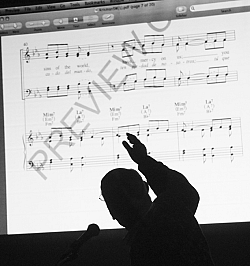Changes to Roman Missal the focus of conference

SALT LAKE CITY — With the introduction of the third edition of the Roman Missal, English-speaking Catholics around the world will notice changes large and small in the liturgy in which they now participate. The changes are intended to bring the English words closer in meaning to the original Latin. For example, when the priest says, "The Lord be with you," the response will be "And with your spirit," rather than "And with you." The changes will go into effect the first Sunday of Advent. Dioceses across the United States already are preparing parishioners for the new words and music. The third Roman Missal was the focus of the 49th annual Southwest Liturgical Conference, held Feb. 2-5 in Salt Lake City. Many of the workshops and plenary addresses dealt with the changes. The changes are not without controversy, as several of the conference speakers acknowledged. "We have to be very sensitive to the fact that the very slightest change can be very difficult," said the Most Rev. Gerald F. Kicanas, bishop of Tucson, during his plenary address. He urged parish leaders to help people "work through their frustrations, their annoyances, their difficulties" with the changes. "The case for the revised translation has been difficult to sell," admitted Father Paul Turner during his plenary address, "but having watched it at the table for the past few years I’ve become convinced there really is a good case." Fr. Turner is a facilitator for the International Commission on English in the Liturgy. The new translation, he said, is "more suitable to the spiritual needs and capabilities of the people of God in the light of the Second Vatican Council." This isn’t the first time the liturgy has been modified. The prayer now known as Eucharistic Prayer II, to give one example, was written around the third century as a catechetical aid for a new bishop, Fr. Turner said. In the centuries since, many changes were made, including the addition of the Sanctus, which hadn’t been invented when the prayer was first written. Many of the word changes for the third edition are improvements, Fr. Turner said, but "there are other examples where, I admit, the revised translation will cause some people to cock their heads, raise their eyes and look perplexed." For example, whereas the current prayer asks God ‘to make us worthy to share eternal life,’ in the new translation it asks ‘that we may merit to be co-heirs to eternal life.’ This will require catechesis, because it must be understood that we share Christ’s merit, that "we are beneficiaries, not earners, of salvation," Fr. Turner said. The resources for such catechesis are many, Fr. Turner said. "We have more catechetical ability now than we did in the past, so our preparation for this translation is vaster and deeper than has ever happened before." Each parish will need to address its individual needs to educate parishioners on the changes, several of the speakers said. Dr. Jane Regan, associate professor of theology and religious education at Boston College School of Theology and Ministry, urged parish leaders to obtain and use the resources available from the Vatican and the U.S. Conference of Catholic Bishops. "They give both hope and, dare I say, ammunition, to engage in what sometimes turns out to be a battle," she said. She suggested that, rather than lectures, educators have adult parishioners engage in "sustained, critical and directed conversation…Adults learn best in conversation with other adults about things that matter," she said. Monsignor Anthony Sherman, executive director of the USCCB Secretariat of Divine Worship, said the best way to begin implementing the changes is "to start somewhere. Even if it’s a tiny, itsy-bitsy thing, like you put something in your bulletin. Right now the important thing is, as we say in Brooklyn, ‘Don’t do nothin’. At least do something. It’s very important."
© Copyright 2025 The Diocese of Salt Lake City. All rights reserved.

Stay Connected With Us